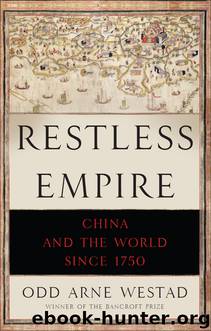Restless Empire: China and the World Since 1750 by Odd Arne Westad

Author:Odd Arne Westad [Westad, Odd Arne]
Language: eng
Format: epub
Tags: General, History, Political Science, Asia, China, International Relations, Modern, Military
ISBN: 9780465029365
Publisher: Basic Books
Published: 2013-01-15T07:18:19+00:00
ANY SOCIETY PUT UNDER the stress of massive warfare will suffer, not just at the time but for years to come. China was no exception. Everywhere the Japanese armies went, Chinese civilians suffered, through war-induced atrocities, starvation, or the humiliation of foreign control. But those who were drawn through the meat grinder of the defending power, the Guomindang, suffered too. It is likely that more GMD soldiers died from disease and starvation during the war than the number of those who fell on the battlefield. As the GMD armies ran out of supplies, they confiscated the scarce goods and produce of the peasants. And as the war wore on, more and more peasant communities in China cared less who was in control than how hunger and killing could be avoided in their villages. In many areas the Japanese were simply considered one outside power among many, and the population’s anger was sometimes more intense at the behavior of Chinese troops than against the Japanese.
In economic terms, the war against Japan was a disaster for China. A significant part of what had been constructed in the first part of the twentieth century was destroyed: communications, industry, irrigation. It is often said that regions that depend on basic agricultural production suffer less during wartime than more complex economies, but this was not true for China in the mid-twentieth century. The war with Japan came as a climax of a century of rural deprivation, in which peasant room for survival had become increasingly narrow. Trade, which had always played a key role in the Chinese agricultural economy was impeded, and in some areas stopped. Access to fertilizers and water was limited. Henan province went through a large-scale famine in 1942–1943, in which drought and military procurements combined to kill off two to three million people and make another three million homeless. While peasants in the province starved, Chinese armies continued to requisition grain and conscript laborers. As the American journalist Theodore White described it,
Download
This site does not store any files on its server. We only index and link to content provided by other sites. Please contact the content providers to delete copyright contents if any and email us, we'll remove relevant links or contents immediately.
| Africa | Americas |
| Arctic & Antarctica | Asia |
| Australia & Oceania | Europe |
| Middle East | Russia |
| United States | World |
| Ancient Civilizations | Military |
| Historical Study & Educational Resources |
The Sympathizer by Viet Thanh Nguyen(4384)
The Rape of Nanking by Iris Chang(4201)
World without end by Ken Follett(3472)
Ants Among Elephants by Sujatha Gidla(3459)
Blood and Sand by Alex Von Tunzelmann(3193)
Japanese Design by Patricia J. Graham(3163)
The Queen of Nothing by Holly Black(2584)
City of Djinns: a year in Delhi by William Dalrymple(2547)
Foreign Devils on the Silk Road: The Search for the Lost Treasures of Central Asia by Peter Hopkirk(2454)
India's Ancient Past by R.S. Sharma(2450)
Inglorious Empire by Shashi Tharoor(2436)
Tokyo by Rob Goss(2427)
In Order to Live: A North Korean Girl's Journey to Freedom by Yeonmi Park(2377)
Tokyo Geek's Guide: Manga, Anime, Gaming, Cosplay, Toys, Idols & More - The Ultimate Guide to Japan's Otaku Culture by Simone Gianni(2360)
India's biggest cover-up by Dhar Anuj(2348)
The Great Game: On Secret Service in High Asia by Peter Hopkirk(2329)
Goodbye Madame Butterfly(2249)
Batik by Rudolf Smend(2179)
Living Silence in Burma by Christina Fink(2059)
